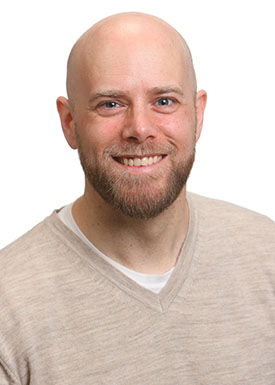In the online world where radical ideologies flourish in the shadows, Dr. Luc Cousineau is shining a bright, necessary light.
As co-director of research at the (CIFRS) and a Recreation Management instructor in the School of Health and Human Performance, he studies how online communities — particularly those focused on anti-equity and masculinist ideologies — form, evolve and exert influence.
Unpacking online extremism
Dr. Cousineau’s path to this research is personal as well as academic.
“I grew up in a household where a lot didn’t follow ‘traditional’ gender roles,” he says. “That shaped how I saw the world and later how I understood power and identity.”
After earning degrees in Women’s Studies and Outdoor Recreation and working in gendered environments like adventure education, he found himself drawn to questions about how masculinity operates, particularly in online spaces like Reddit.
Young men are being exposed to anti-equity and anti-feminist content not by choice, but by algorithm.
His doctoral work examined the ‘manosphere,’ a loosely connected network of men’s rights activists and other disgruntled men. He has also researched affiliated groups, including incels, short for involuntary celibates — an online subculture of men who express rage at women for ‘denying them sex’ and fantasize about and celebrate those who commit mass violence.
What he found was not only do these communities promote misogyny and male supremacy, but they offer a sense of belonging and purpose to disaffected men, especially younger ones.
“They feel heard,” Dr. Cousineau explains. “And that’s powerful.”
At the forefront of urgent research
 Dr. Cousineau’s work underscores the Faculty of Health’s commitment to tackling complex, contemporary health and social challenges. With CIRFS, he’s part of a small but mighty national research network focused on the important work of analyzing and disrupting the spread of far-right extremism in Canada.
Dr. Cousineau’s work underscores the Faculty of Health’s commitment to tackling complex, contemporary health and social challenges. With CIRFS, he’s part of a small but mighty national research network focused on the important work of analyzing and disrupting the spread of far-right extremism in Canada.
“We’re seeing these ideologies filter into schools, homes and workplaces," says Dr. Cousineau, shown right. Young men are being exposed to anti-equity and anti-feminist content not by choice, but by algorithm.”
He explains that social media platforms like TikTok and YouTube are structured to feed users provocative material that maximizes engagement regardless of intent or age. “It’s not about politics for them, it’s about profit.”
Why this matters now
The consequences of unchecked radicalization are far-reaching. Dr. Cousineau notes that while most young men won’t commit acts of violence, the ideological groundwork is being laid in digital communities every day. And it’s not just found in fringe corners of the internet; these narratives are entering classrooms and influencing behaviour.
In one ongoing study, Dr. Cousineau and colleagues are examining how teachers are coping with the growing presence of misogynist and extremist beliefs in students as young as 11 and 12.
We’re hearing teachers say that boys are telling them outright that they don’t have to listen to women
“We’re hearing teachers say that boys are telling them outright that they don’t have to listen to women,” he says. “That’s not just disruptive, it’s dangerous."
Despite the heaviness of the subject matter, Dr. Cousineau remains committed. The nature of the work demands that he spends countless hours in some very dark spaces but he protects his own mental health by limiting social media exposure and building strong peer-support networks.
“Everyone I know who does this work has a therapist,” he laughs. “You have to.”
His motivation however is serious. “We need to understand this ecosystem if we want to prevent harm and build a more equitable future. That starts with paying attention — even when it’s hard.”

